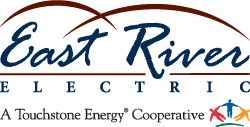A Connected Home Research Project launched on Wednesday as part of Dakota State University’s (DSU) MadLabs facility grand opening. The Connected Home project is a partnership between East River Electric Power Cooperative, DSU and the National Rural Electric Cooperative Association and is exploring technologies that will be included in the next generation rural home. It is also working to find solutions that will allow electric cooperatives to play an integral role in helping consumers optimize their energy use.
East River Electric is a wholesale power supply cooperative headquartered in Madison which serves 24 distribution cooperatives and one municipal electric system across eastern South Dakota and western Minnesota. NRECA is a national association of over 900 electric cooperatives and is headquartered in Washington, D.C.
“From wi-fi thermostats to smart appliances, our network of electric cooperatives is seeing increased adoption of smart home technologies among consumers,” said East River Chief Member and Public Relations Officer Chris Studer. “While current technologies can help manage electricity usage and benefit consumers, we noticed a gap between the capabilities of those technologies and the needs of our utility network to connect to those technologies. We hope to close that gap through this project.”
Researchers will investigate current products on the market and determine how utilities could potentially utilize existing technologies to control appliances and connected technologies within a home. They will also research the potential to build utility-specific technologies, both hardware and software, that could be used in homes to optimize energy usage and control power costs. A final phase of the project could include field testing of potential products in end consumer homes to determine the viability of any hardware and software that is developed.
“As use of smart home technology continues to increase among consumers, we’re hoping to use this research project to identify technologies that will help us in our transition to a new energy management future or to develop our own utility-specific technologies that can be replicated at cooperatives around the country to help consumers optimize energy usage and save them money,” said Studer.
The project’s research space resembles a smart home kitchen with additional appliances including a washer, dryer and water heater. “Many of the products included in the space were sourced from local companies. We are grateful to Rosebud Cabinets, KolorWorks, Karl’s Appliance and Montgomery’s for assisting in the construction and design of the space,” said Studer.

